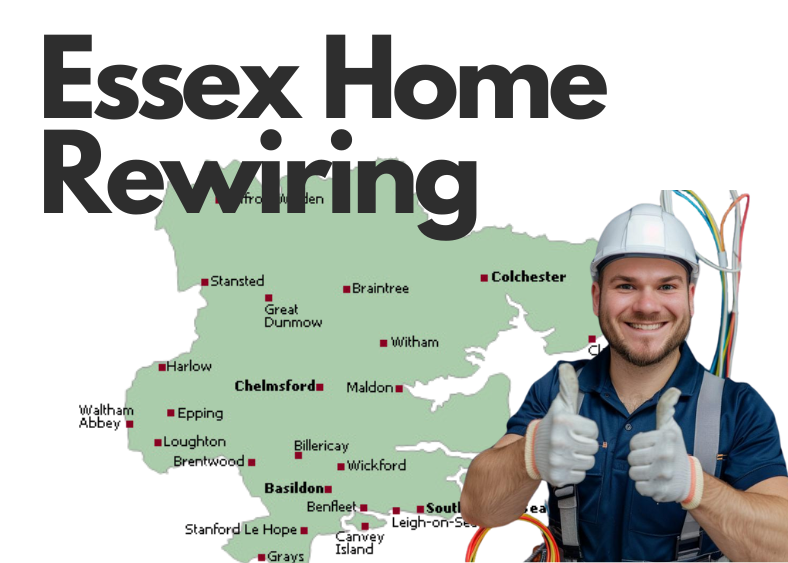Home Rewire Essex
Your Local House Rewiring Experts
Home Rewire Essex are Essex based experts in the rewiring of properties. From a cozy studio flat to a spacious country manor, we have the expertise to upgrade the wiring of your residence.
Whether you are replacing the electrics of your entire home, or simply wish to install extra sockets or light switches to better accommodate your household's needs, our approachable, skilled and dependable electricians can assist you in transforming the electrical systems in your property.
Professional Machine Control Models
-
Rewiring Essex Homes
Our skilled electricians specialise in rewiring homes across Essex, ensuring your property's electrical system is safe, up-to-date, and compliant with all current regulations. From partial rewires to complete home rewiring, we offer tailored solutions to meet your specific needs.
-
NICEIC Approved Electricians
As an NICEIC Approved Contractor, our team of experienced electricians adheres to the highest industry standards. We consistently deliver top-quality workmanship, ensuring your home's wiring is installed safely and efficiently. Trust our expertise for complete peace of mind.
-
Upgrade. Modernise. Secure.
Upgrading your home's wiring not only enhances safety but also enables you to modernise your electrical setup. From installing smart home technology to adding EV charging points, we help you future-proof your home. Our comprehensive rewiring services provide a secure and reliable electrical foundation for your property.
-
Free Quote
Request a complimentary, no-obligation quote for your home rewiring project. Our experienced team will assess your property's unique requirements and provide you with a detailed, transparent quote tailored to your specific needs. We believe in upfront, honest pricing with no hidden costs, ensuring you have a clear understanding of the investment required to upgrade your home's electrical safety and efficiency.
GET A QUOTE
Contact us

Our Rewiring Process
List of services
-
1. Electrical SurveyItem link List Item 1
Our certified electricians thoroughly assess your home's current wiring and provide expert recommendations.
-
2. PlanningItem link List Item 2
We collaborate with you to create a wiring plan that modernizes your home and meets your specific power and lighting needs.
-
3. First FixItem link List Item 3
We carefully remove old wiring and install new regulation-compliant wires, cables, and mounting boxes.
-
4. Second FixItem link List Item 4
Our team installs faceplates, connects switches, sockets, and lighting fixtures, and powers up your new system.
-
5. Safety ChecksItem Link
We conduct comprehensive testing to verify that the rewired circuits meet BS 7671 wiring standards and provide you with an electrical installation certificate.
-
7. Clean-upItem Link
We thoroughly clean the work areas and remove waste, leaving your property tidy and ready for you to enjoy.
Essex Electrician Home Rewiring Services
-
Complete House Rewire
Read more about 3D ModelsIs your home due for a full electrical overhaul? Our skilled electricians specialize in complete house rewiring services, ensuring your property's wiring is up to date, safe, and compliant with all current regulations. We'll work closely with you to plan your new electrical layout, efficiently strip out the old wiring, and install a modern, future-proofed system tailored to your needs..
-
Partial Rewiring and Upgrades
View ScabblingAlready have a modernized electrical system but need to update specific areas or add new features? Our team excels at partial rewiring and upgrade services. Whether you're renovating your kitchen, adding a home office, or looking to install smart home technology, we'll seamlessly integrate the new wiring into your existing system, providing a safe and reliable solution.
-
Additional Sockets and Lighting Installation
View Floor SawingEnhance your Essex home's functionality and ambiance with expertly placed additional sockets and lighting. Our electricians will assess your space and recommend optimal positioning for new outlets, switches, and light fittings. From convenient USB sockets to stylish accent lighting, we'll help you create a practical and inviting living environment tailored to your unique needs.
How Much Does It Cost to Rewire a House in the UK?
The average cost to fully rewire a house in the UK ranges from £2,000 for a one-bedroom home to £8,000-£10,000 for a five-bedroom property. However, the final price will depend on several key factors:
- Size of the property: Rewiring a flat is generally less expensive than a 2 or 3-bedroom house, as the size directly impacts the amount of work required.
- Number of electrical points per room: A higher number of sockets and switches will increase the complexity and duration of the rewiring process, ultimately affecting the overall cost.
- Type of walls: Houses with concrete walls require more time-consuming and labor-intensive channeling compared to properties with easily accessible plasterboard walls, resulting in higher costs.
Other aspects that influence the total cost of rewiring a home include:
- Number of rooms in the property
- Quantity and type of light fittings
- Amount and length of cabling needed
At Home Rewire Essex, we provide competitive and transparent pricing tailored to your specific property and requirements. Our experienced electricians will assess your home and offer a bespoke quote that ensures you receive the best value for money without compromising on quality or safety.
For an accurate estimate of rewiring costs for your Essex home, contact us today to schedule a comprehensive electrical survey and consultation.
Which Areas of Essex Do We Service?
We provide professional home rewiring services throughout Essex, including:
- Basildon
- Braintree
- Brentwood
- Castle Point
- Chelmsford
- Colchester
- Epping Forest
- Harlow
- Maldon
- Rochford
- Southend-on-Sea
- Tendring
- Thurrock
- Uttlesford
Whether you're located in a bustling town or a quiet village, our skilled electricians are ready to assist with your home rewiring needs across the county of Essex. From the historic streets of Colchester to the seaside charm of Southend-on-Sea, we've got you covered. Don't see your specific location listed? Contact us to discuss how we can help upgrade your home's electrical system, no matter where you are in Essex.
Frequently Asked Questions
-
Can you rewire a house without removing drywall?
It is generally not possible to completely rewire a house without removing at least some drywall. Cables typically run through joists and are clipped in place, necessitating drywall removal for access.
Wiring in a house can be done in two ways - through the ceiling or the floor. In both cases, drywall will need to be removed or significantly damaged to access the existing wiring. Even though wiring typically runs in straight, predictable paths, the cables are secured to joists, making removal impossible without opening up the drywall.
-
Does home insurance cover old wiring?
Home insurance policies generally cover electrical wiring, but the extent of coverage may vary depending on factors like the age of the home. If you have an older home, updating the wiring can help reduce premiums and protect against electrical fires.
Your homeowner's insurance will typically cover your home's wiring. However, if you have an older home with outdated electrical systems, it is advisable to have it rewired. Not only can this help lower your insurance premiums, but it also significantly reduces the risk of electrical fires and accidents.
-
Do homes built in the 1970s need rewiring?
Homes from the 1970s don't automatically require rewiring if the electrical system is functioning properly. However, it's wise to have an Electrical Installation Condition Report (EICR) conducted to identify any potential issues or room for improvement.
Just because a house was built in the 1970s doesn't mean it definitely needs rewiring. If the electrics are working correctly, rewiring may not be necessary. However, before making a decision, it's always best to have an EICR carried out. This report will pinpoint any problems that need immediate attention and suggest improvements to enhance safety.
Some signs that a property from this era might need rewiring include:
An outdated fuse box lacking modern protective devices like RCDs
Frequent tripping of fuses or circuit breakers
Burning smells, buzzing sounds, or sparking from outlets or wiring
Electric shocks from metal fixtures or appliances
-
How long should wiring last in a house?
The lifespan of electrical wiring depends on various factors, but properly installed wiring with quality materials can last 50-70 years on average. The condition of the wire insulation and the home's construction play significant roles in wiring longevity.
In ideal conditions, electrical wiring can last a century or more. However, the actual lifespan largely depends on the quality of the wiring materials and installation. The insulation surrounding the wires, which typically lasts around 50 years, is a crucial factor.
Other aspects that influence wiring longevity include:
- Overall build quality of the house
- Type and effectiveness of insulation used
- Protection from moisture and other environmental hazards
For example, wiring in a poorly insulated shed exposed to humidity will degrade much faster than wiring in a well-built, weatherproof home.
-
How many outlets can be on one breaker?
While there is no definitive limit to the number of outlets on a single breaker, best practices suggest not exceeding 20 outlets per breaker to prevent overloading. A typical 20-amp breaker can handle around 30 amps of current draw across multiple outlets.
A standard home's outlets are usually wired on a 20-amp circuit breaker, allowing for a maximum load of approximately 2400 watts. Theoretically, you could install an unlimited number of outlets on this breaker, but it's generally recommended to limit it to 20.
This guideline assumes each outlet will draw a maximum of 1.5 amps, even though individual outlets are rated for 15-20 amps.
By limiting the total number of outlets to 20, you ensure that even if all outlets are used simultaneously, the total load will not exceed the breaker's 30-amp threshold, preventing overloads and tripped breakers.
To illustrate this, consider the power consumption of common devices:
- A phone charger typically uses 2-6 watts
- A standard kettle uses around 1200 watts
If you were to use all 20 outlets to power kettles simultaneously, the breaker would trip due to exceeding the 2400-watt limit. However, under normal usage conditions with a mix of devices, 20 outlets on a single breaker are generally safe.
-
How do I earth my house electrics?
To properly earth your home's electrical system, you'll need to install a grounding rod and connect it to your main electrical panel with a grounding wire. The rod should be driven at least 8 feet into the ground near the panel.
Here's a step-by-step overview of the process:
Ensure your house is properly grounded by installing a grounding rod near your main electrical panel (consumer unit). The rod should be driven 8 feet (2.4 meters) into the earth.
Connect a 6-gauge (16mm) grounding wire from the rod to a dedicated grounding bar inside your main panel.
Connect all the grounding wires from individual circuits to the same grounding bar in the main panel.
Have a licensed electrician test the grounding system and inspect each circuit to ensure proper installation and functionality.
-
Can a house with aluminum wiring be insured?
It is possible to insure a house with aluminum wiring, but it may be more challenging and require additional steps compared to homes with copper wiring. Some insurers may refuse to cover homes with aluminum wiring due to its reputation for overheating and fire risks.
Insuring a home with aluminum wiring is possible but can be more difficult than insuring one with copper wiring. Due to the historical issues with aluminum wiring, such as incorrect installation leading to overheating and fire hazards, some insurance companies may outright refuse coverage.
However, there are insurers who will cover homes with aluminum wiring, provided certain conditions are met:
An electrical inspection verifying the use of proper connectors and panels compatible with aluminum wiring
Confirmation that the aluminum wiring meets all relevant safety standards and passes necessary tests
-
Do old wires increase electric bill?
Old wiring does not directly increase your electricity bills. However, outdated or faulty wiring can indirectly lead to higher energy consumption through issues like damaged thermostats, malfunctioning appliances, or underground wiring problems.
Old wiring itself does not inherently cause higher electricity bills. That said, outdated or improperly maintained wiring can indirectly contribute to increased energy usage in several ways:
- Faulty wiring causing appliances to work inefficiently or fail prematurely
- Damaged thermostats leading to inaccurate temperature regulation
- Underground wiring issues resulting in energy loss
While the age of the wiring doesn't directly affect electricity costs, it's essential to address any wiring problems to prevent potential energy waste and ensure the safety and efficiency of your home's electrical system.
-
How do I know if my house is earthed?
The most reliable way to determine if your house is properly earthed is to have a professional electrician conduct a thorough electrical inspection and testing. Visual clues, like the presence of grounding wires, may not guarantee a fully functional earthing system.
To be 100% certain that your home is correctly earthed, the best course of action is to hire a qualified electrician to perform an in-depth electrical inspection and testing. Even if you notice grounding wires connected to your main panel, it doesn't necessarily mean they are continuous or installed correctly.
However, if you want to do a visual check before calling an electrician, look for the following:
A green and yellow wire (the grounding wire) connected to your main electrical panel
Grounding wires connected to metal water and gas pipes
Keep in mind that these visual indicators don't guarantee a fully functional earthing system, so it's always best to have a professional inspection for confirmation and safety.
-
Is aluminum wiring bad?
Aluminum wiring is not necessarily bad, but it has distinct characteristics that set it apart from the more common copper wiring. These differences can lead to problems if they are not accounted for during installation and maintenance. Some key differences include:
- Softness: Aluminum is softer than copper, making it more prone to damage
- Corrosion: Aluminum corrodes differently than copper
Expansion and contraction: Aluminum wires expand and contract more than copper wires under temperature changes
If an electrician takes these differences into account and uses the appropriate connectors and panels, aluminum wiring can perform just as safely and effectively as copper wiring.
-
Can you mix aluminum and copper wiring?
Mixing aluminum and copper wiring directly is not recommended, as it can lead to corrosion, loose connections, and potential fire hazards. However, if a special splice connector rated for joining aluminum and copper is used, the two types of wiring can be safely connected.
Directly connecting aluminum and copper wiring is not advisable because when dissimilar metals are in contact, one will corrode faster than the other. This corrosion can cause several problems:
Weakened connections and reduced electrical conductivity
Increased risk of short circuits and electrical fires
While it is technically possible to join aluminum and copper wiring using a special splice connector designed for this purpose, it is generally recommended to replace aluminum wiring with copper whenever possible for enhanced safety and longevity.
GET A QUOTE
Contact us
Get In Touch
Satisfied Clients

"Home Rewire Essex exceeded all our expectations with their speedy, thorough, and high-quality work in Southend-on-Sea - highly recommend!"
- Emily Wright, Southend-on-Sea
Button
"Choosing Home Rewire Essex for our home renovation in Colchester was the best decision; their professionalism and expertise were unmatched." -
Mark Thompson, Colchester
Button



